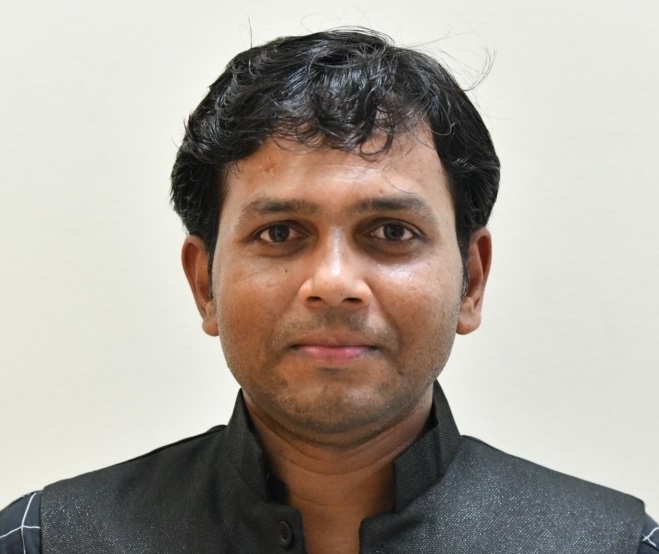Damodar Reddy Edla
Eminent Speaker
Short CV:
Dr. Damodar Reddy Edla is presently working as Associate Professor in the department of Computer Science and Engineering at National Institute of Technology (NIT) Goa. He received PhD degree in computer science and engineering from Indian School of Mines Dhanbad in 2013. He has published more than 250 research articles and 6 Books by reputed publishers such as CRC Press Taylor & Francis. Dr. Reddy has 15 granted patents in Brain Computer Interface and Sensors. He is a Fellow of IETE, Senior Member of IEEE, ACM and IACSIT and also received several awards such as INSA Visiting Scientist, ACM Eminent Speaker, Asia-Arab Distinguished Faculty Award, CSIR-Senior Research Fellowship, IEEE TIM Outstanding Editor, IEI Chartered Engineer etc. 10 of his Ph. D scholars have been awarded Doctorates. Dr. Reddy was invited as a Visiting Researcher at Saint Mary's University, Canada, Visiting Scientist at Ullster University, Northern Ireland, Visiting Professor at University of Southampton, UK and Visiting Research Consultant at AI Tech, Leeds, UK. Further, Dr. Reddy also has 6 sanctioned research projects of worth more than 4 crores. To the best of his achievements, Dr. Damodar Reddy Edla was enlisted in the ‘World Ranking of Top 2% Scientists, 2023’ released by Stanford University. Dr. Reddy delivered guest lectures, keynote talks and expert lectures in more than 300 Engineering Institutes, Universities.
Title of Talk 1: Brain-Computer Interface: Challenges and Applications
Synopsis: The talk explores the cutting-edge field of brain-computer interfaces (BCIs). It delves into the remarkable potential of BCIs to establish direct communication pathways between the brain and external devices, revolutionizing various fields including healthcare, gaming, and assistive technology. The discussion highlights the intricate challenges involved in developing effective BCIs, such as signal processing, electrode placement, and decoding neural activity. Furthermore, it explores the diverse applications of BCIs, ranging from restoring motor function in paralyzed individuals to enhancing cognitive abilities in healthy users. Overall, the talk provides insight into the exciting advancements and remaining hurdles in the field of brain-computer interfaces, along with a practical exposure using 16 channel EEG data acquisition system.
Title of Talk 2: Human Computer Dialogue Systems using Natural Language Processing and Brain-Computer Interface
Synopsis: The talk delves into the integration of two groundbreaking technologies: natural language processing (NLP) and brain-computer interface (BCI). It explores the potential of combining these technologies to enable seamless communication between humans and computers through natural language inputs and neural signals. The talk highlights the challenges involved in developing human-computer dialogue systems that utilize both NLP and BCI technologies, including signal processing, feature extraction, and machine learning algorithms. Furthermore, the talk examines the wide-ranging applications of such systems, from improving accessibility for individuals with motor disabilities to enhancing user experience in virtual reality environments. By integrating NLP and BCI, these dialogue systems have the potential to revolutionize human-computer interaction by enabling more intuitive and efficient communication. Overall, the talk provides valuable insights into the intersection of natural language processing and brain-computer interface technologies, offering a glimpse into the future of human-computer communication.
Title of Talk 3: Neuro-adaptive Motor Imagery Classification for Prosthetic Device Control
Synopsis: The talk explores the innovative approach of using neuro-adaptive techniques for classifying motor imagery signals to control prosthetic devices. It begins by discussing the challenges faced by individuals with limb loss and the potential of prosthetic devices to restore their motor functions. The presentation then explores into the concept of motor imagery, where individuals imagine performing specific movements, and how this can be translated into control signals for prosthetic devices. It introduces neuro-adaptive techniques, which dynamically adjust classification algorithms based on the user's neural signals and behavior, improving the accuracy and reliability of motor imagery classification. The talk highlights the technical aspects of implementing neuro-adaptive algorithms for motor imagery classification, including signal processing, feature extraction, and machine learning models. It also discusses the importance of user feedback and adaptation in optimizing the performance of prosthetic control systems. Furthermore, the presentation showcases the potential applications of neuro-adaptive motor imagery classification in enhancing the usability and effectiveness of prosthetic devices, ultimately improving the quality of life for individuals with limb loss. Overall, the talk provides valuable insights into the development of advanced prosthetic control systems that leverage neuro-adaptive techniques to enable intuitive and precise motor control based on neural signals.

Damodar Reddy Edla
Qualifications: PhD in Computer Science and Engineering , ISM Dhanbad
Title: Associate Professor
Affiliation: Dept. of Computer Science and Engineering, National Institute of Technology Goa
LinkedIn:
Twitter/X:
Facebook:
Instagram:
Email:
About the speaker: